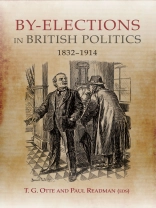Explores the many issues surrounding by-elections in the period which saw the extension of the franchise, the introduction of the ballot, and the demise of most dual member constituencies.
Between the 1832 Great Reform Act and the outbreak of World War One in 1914, over 2, 600 by-elections took place in Britain. They were triggered by the death, retirement or resignation of sitting MPs or by the appointment of cabinet ministers and were a regular feature of Victorian and Edwardian politics. They furnished political parties and their leaders with a crucial tool for gauging and mobilising public opinion. Yet despite the prominence of by-election contests in the historical records of this period, scholars have paid relatively little attention to them. As this book shows, these elections deserve to be taken as seriously today as people took them at the time. They providedimportant linkages between local and national politics, between the four parts of the United Kingdom and Westminster, and between foreign and domestic affairs. They are vital to understanding the evolving electioneering machineries, the varying language of electoral contests, the traction that particular issues had with a growing and frequently volatile electorate, and the fluctuating fortunes of the political parties.
This book, consisting of original work by leading political historians, provides the first synoptic study of this important subject. It will be required reading for historians and students of modern British political history, as well as specialists in electoralhistory and politics.
T. G. Otte is Professor of Diplomatic History at the University of East Anglia. He is the author and/or editor of some thirteen books. Among the most recent is
The Foreign Office Mind: The Making of British Foreign Policy, 1865-1914; Paul Readman is Senior Lecturer in Modern British History at King’s College London. He is the author of
Land and Nation in England: Patriotism, National Identity and the Politics of Land 1880-1914.
Contributors: Luke Blaxill, Angus Hawkins, Geoffrey Hicks, Phillips Payson O’Brien, T.G. Otte, Ian Packer, Gordon Pentland, Paul Readman, Kathryn Rix, Matthew Roberts, Philip Salmon, Anthony Taylor
Tabla de materias
Introduction – T. G. Otte and Paul Readman
‘Plumping Contests’: The Impact of By-elections on English Voting Behaviour, 1790-1868 – Philip Salmon
Government Appointment By-elections: 1832-86 – Angus Hawkins
‘We should have had 1, 000’: The By-elections of the 1874 Parliament – Geoffrey Hicks
‘The Glamour of Independence’: By-elections and Radicalism during the Liberal Meridian, 1869-83 – Antony Taylor
‘The Swing of the Pendulum at Home’: By-elections and Foreign Policy, 1865-1914 – T. G. Otte
By-elections and the Modernisation of Party Organisation, 1867-1914 – Kathryn Rix
‘A Terrific Outburst of Political Meteorology’: By-elections and the Unionist Electoral Ascendancy in Late-Victorian England – Matthew Roberts
Land Reform and By-elections, 1885-1914: Do By-elections Matter? – Ian Packer
Edwardian By-elections – Paul Readman and Luke Blaxill
Lloyd George, Limehouse and the Realignment of British Politics: The Bermondsey By-election of 1909 – Phillips Payson O’Brien
By-elections and the Peculiarities of Scottish Politics, 1832-1900 – Gordon Pentland
Sobre el autor
T.G. Otte is Professor of History at the University of East Anglia and author of nineteen books, including By-elections in British Politics, 1832-1914 (Boydell 2013) and Statesman of Europe: A Life of Sir Edward Grey (Allen Lane, 2020).












